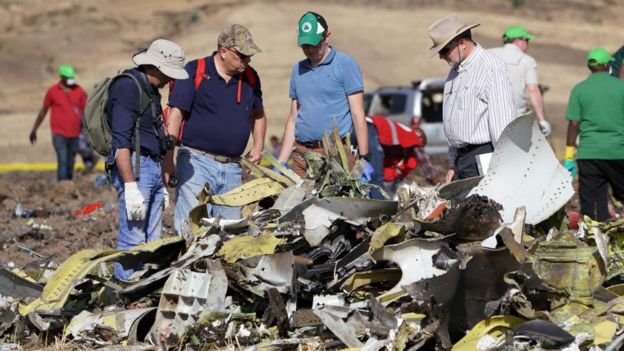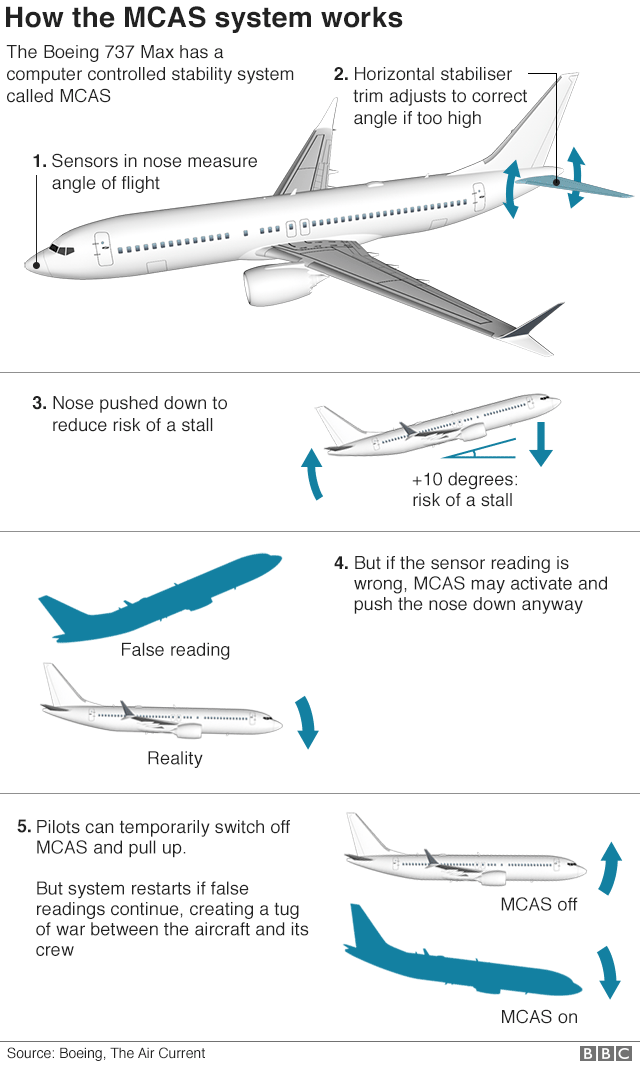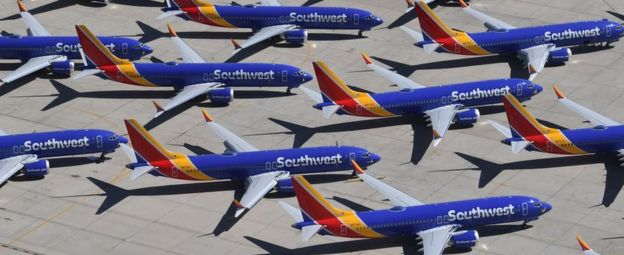
This article is more than
6 year old
Pilots "repeatedly" followed procedures recommended by Boeing before the crash, according to the first official report into the disaster.
Despite their efforts, pilots "were not able to control the aircraft", Transport Minister Dagmawit Moges said.
Flight ET302 crashed after take-off from Addis Ababa, killing 157 people.
It was the second crash of a Boeing 737 Max aircraft in five months.
Last October, Lion Air flight JT 610 crashed into the sea near Indonesia killing all 189 people on board.
In a news conference in Addis Ababa, Ms Dagmawit said: "The crew performed all the procedures repeatedly [that were] provided by the manufacturer but were not able to control the aircraft."
The 737 Max family of aircraft was grounded following the Ethiopian Airlines crash, a move affecting more than 300 planes.
The preliminary report did not attribute blame for the crash. But it says the crew were fully qualified to conduct the flight, and that they performed all the expected procedures correctly.
The report goes on to recommend that Boeing review the 737 Max's "flight control system related to flight controllability" and that aviation regulators ensure this is done before the aircraft goes back into the air.

Crash investigators have focused their attention on the Manoeuvring Characteristics Augmentation System (MCAS) - software designed to help prevent the 737 Max from stalling.
The software reacts when sensors in the nose of the aircraft show the jet is climbing at too steep an angle, which can cause a plane to stall.
The report does not mention the MCAS by name, but it does detail during the minutes after take off the problems the pilots were having in trying to control the aircraft's angle of flight.
At one point the captain called out three times "pull up", and seconds after instructed the first officer to tell Air Traffic Control that they had a flight control problem.
In a statement on Thursday, the chief executive of Ethiopian Airlines, Tewolde GebreMariam, said he was "very proud" of the pilots' "high level of professional performance".
"It was very unfortunate they could not recover the airplane from the persistence of nosediving," the airline said in a statement.

An investigation into the Lion Air flight suggested the system malfunctioned, and forced the plane's nose down more than 20 times before it crashed into the sea.
The preliminary report from Indonesian investigators found that a faulty sensor on the aircraft wrongly triggered MCAS without the pilots' knowledge.
Boeing has been working on an upgrade of the MCAS software since the Lion Air crash.
It has said the system can be disabled - allowing pilots to regain control if there appears to be a problem.
But the latest comments from Ethiopian officials suggest that pilots could not regain control, despite following procedures recommended by Boeing.
By Tom Burridge, BBC transport correspondent

Two crashes, five months apart, with a total of 346 people dead.
Both preliminary crash reports suggest a new design to the 737 Max 8 malfunctioned, pushing each plane repeatedly into a nosedive.
One lawsuit has been filed. More are likely.
The suffering of those who've lost loved ones can't be quantified. But the commercial toll for the manufacturer and damage to its reputation, at this stage, can't be either.
Hundreds of 737 Maxs are grounded worldwide. Thousands of orders are, for now on ice, and some could even be in jeopardy.
The Max was Boeing's answer to Airbus' A320: a single-aisle, fuel-efficient short-haul plane.
But in the opinion of one experienced 737 pilot, the new anti-stall system, which was added to the aircraft and contributed to both crashes, was "flawed".
Boeing is working to fix it. It needs to get the aircraft certified as safe and back in the air as soon as it can.
What is Boeing doing improve the aircraft's safety?
In a statement on Thursday, Boeing said: "We will carefully review the AIB's preliminary report and will take any and all additional steps necessary to enhance the safety of our aircraft.
"To ensure unintended MCAS activation will not occur again, Boeing has developed and is planning to release a software update to MCAS and an associated comprehensive pilot training and supplementary education program for the 737 MAX."
The company said the update "adds additional layers of protection and will prevent erroneous data from causing MCAS activation. Flight crews will always have the ability to override MCAS and manually control the airplane".
Boeing has issued guidance to pilots on how to manage MCAS, and it plans to install an extra warning system on all 737 Max aircraft, which was previously an optional safety feature.
It is also revising pilot training to provide "enhanced understanding of the 737 Max" flight system and crew procedures.
The planemaker says the upgrades are not an admission that MCAS caused the crashes.